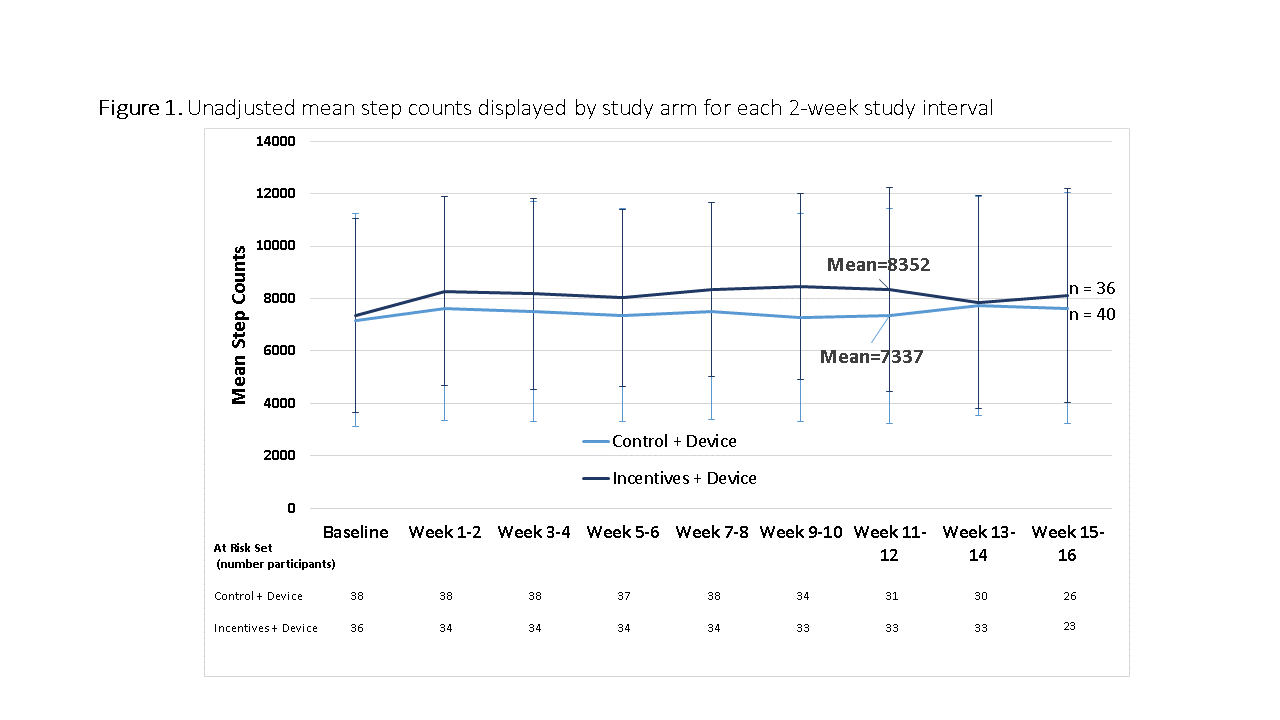A Randomized, Controlled, Trial of Interventions to Promote Walking after Abdominal Organ Transplantation: The LIFT Study
1University of Pennsylvania Perelman School of Medicine, Philadelphia, PA, 2Wharton School, University of Pennsylvania, Philadelphia, PA, 3Department of Biostatistics and Epidemiology, University of Pennsylvania, Philadelphia, PA
Meeting: 2019 American Transplant Congress
Abstract number: 503
Keywords: Kidney transplantation, Liver transplantation, Obesity, Outcome
Session Information
Session Name: Concurrent Session: Non-Organ Specific: Disparities and Access to Healthcare I
Session Type: Concurrent Session
Date: Tuesday, June 4, 2019
Session Time: 2:30pm-4:00pm
 Presentation Time: 2:54pm-3:06pm
Presentation Time: 2:54pm-3:06pm
Location: Room 208
*Purpose: Substantial weight gain and sedentary behavior are common after transplantation. Behavioral economic strategies with financial incentives and reminders may promote healthy behaviors in the general population, but have not been tested in transplantation.
*Methods: LIFT was a prospective, randomized, single-blind pilot trial to evaluate a behavioral intervention using a wearable accelerometer on post-transplant physical activity and weight change. 127 adult liver (LT:n=62) and kidney transplant (KT:n=65) recipients from 2-24 months post-transplant were recruited at one center. Patients were randomized 1:1:1 to a 12-week intervention with 3 arms: Arm 1: control, no device, Arm 2: device only, Arm 3: intervention with device and incentives. After a 2-week run-in, the intervention arm included daily monitoring of step counts and feedback regarding step goals (targeted 15% step increase every 2 weeks up to a threshold 7000 daily steps), and biweekly health engagement questions about healthy diet and physical activity. Patients who achieved step targets and correctly answered questions received small financial incentives.
*Results: Mean age was 52 (SD=13), 42% were White, 27% were Black, and 9% were Hispanic. One third had diabetes, mean BMI was 28 (SD=8). Study retention rate was 92%. Figure 1 shows step-data of 76 participants with accelerometers (Arms 2,3). The mean end of study step count was 7337 (SD=3494) in Arm 2 and 8532(SD=3907) in Arm 3; 1263 steps higher in the intervention arm. Active intervention was associated with a higher proportion of participant-days reaching the 7000-step target (OR 1.99, 95% CI:1.03-1.87, p=0.04) versus device only arm. The median change in weight [IQR] was +0.9 kg [-1.0 to 5.4] in Arm 1 (control, no device); +2.74 kg [-0.5 to 5.4] in Arm 2 (device only), and -0.5 kg [-1.4-3.4] in Arm 3 (intervention); p=0.05 . Reaching 7000 steps was associated with a trend towards weight loss when adjusting for study arm (beta -6.2, 95%CI -15.3-2.8, p=0.17).
*Conclusions: In a 12-week randomized pilot trial, financial incentives were effective in increasing post-transplant walking among KT and LT recipients. A trend towards weight loss was observed among those with greater degree of physical activity. Larger and longer prospective studies focused on physical activity are needed to avoid weight gain and sedentary behavior after transplant.
To cite this abstract in AMA style:
Serper M, Barankay I, Chadha S, Shults J, Reese P. A Randomized, Controlled, Trial of Interventions to Promote Walking after Abdominal Organ Transplantation: The LIFT Study [abstract]. Am J Transplant. 2019; 19 (suppl 3). https://atcmeetingabstracts.com/abstract/a-randomized-controlled-trial-of-interventions-to-promote-walking-after-abdominal-organ-transplantation-the-lift-study/. Accessed February 27, 2026.« Back to 2019 American Transplant Congress

